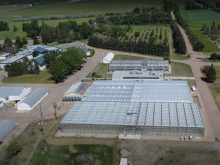Within hours of the Conservative election victory Oct. 14, opponents of the Canadian Wheat Board monopoly were calling for quick action on the issue when Parliament reconvenes.
“This is a promise the Conservatives made and we fully expect them to keep that promise and soon,” Western Canadian Wheat Growers Association chair Mike Bast said from Manitoba. “I hope that opposition MPs realize that the Conservatives won every single rural seat in the wheat board area. Surely that is a message to them.”
In British Columbia, Grain Growers of Canada president Ross Ravelli said on election night the Conservative government should act quickly even though it remains in a minority position in Parliament, 12 seats short of majority.
Read Also

Alberta crop diversification centres receive funding
$5.2 million of provincial funding pumped into crop diversity research centres
“The party was elected in rural Canada, the Liberals are much weaker and I can’t imagine them spending much energy on an issue that does not affect any of their seats,” he said from his Dawson Creek farm. “I think the Liberals will have other things to think about.”
Prince Edward Island Liberal Wayne Easter said the anti-single desk crusaders should not get their hopes up.
“The CWB issue will definitely be on our radar screen and I can tell you if the government tries this again, it will not succeed because they don’t have the numbers,” said Easter. “(Prime minister Stephen) Harper should rethink this and if he wants to try again, he should follow the rules, hold a legitimate vote with a legitimate question and follow the act.”
In Winnipeg during the election campaign, New Democratic Party CWB critic Pat Martin also vowed that the party caucus would fight any government plans to end the monopoly. However, he cast doubt on whether the Liberals really would stand up to the Conservatives.
The much-weakened Liberal party will be distracted for months by a leadership race and that led some analysts last week to suggest Harper will be able to operate as if he had a majority at least for the next year.
“Right now, they can do what they want and nobody would risk bringing them down and triggering another election so now is the time to do controversial things,” said political scientist David Taras from the University of Calgary.
At Augustana campus of the University of Alberta in Camrose, dean Roger Epp agreed.
“My thought is it is the bone the government will throw to its rural prairie base,” he said. “If I was the PM, I would act quickly to get this done while the opposition is weak and distracted.”
However, University of Manitoba political scientist Paul Thomas said he doubted the re-elected government will spend political capital on the issue.
“We are in an economic crisis and I expect that will dominate what the government does, not a regional issue that is divisive,” he said. “Besides, Mr. Harper’s goal is to build the conditions for a majority and one of the issues he has to contend with is his reputation as a bully and an ideologue. I don’t think imposing a policy on the wheat board would help him overcome that. You pick your fights and I don’t see this as one of them.”
At the WCWGA, Bast rejected the idea that dealing with economic turmoil will preclude the Conservatives from dealing with the CWB.
“Regardless of the economic situation, there is a crisis for farmers too and that is that they have no marketing freedom,” he said. “I think the government understands that.”
In fact, the Conservative party used the election campaign to renew its promise to end the CWB monopoly on export barley sales and domestic sales for human consumption. It also talked about “grain” marketing and not just barley, although the government has not held a vote among wheat farmers on the issue.
“We will continue to work with western Canadian grain farmers to ensure that the results of the barley plebiscite are respected and that they are given the freedom to choose whether to sell grain on the open market or through the Canadian Wheat Board,” said the Conservative platform published a week before the vote.
It was one of only four specific farm policy promises.














